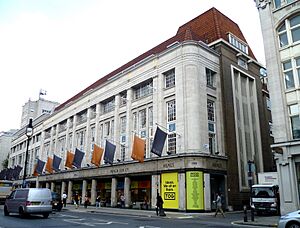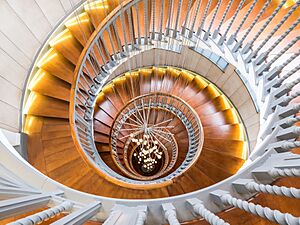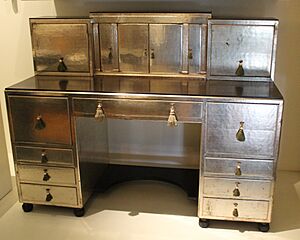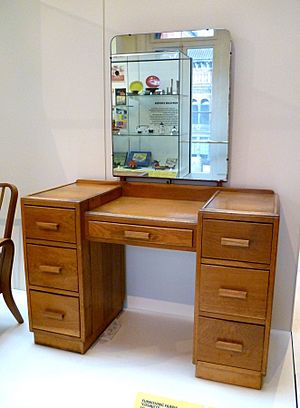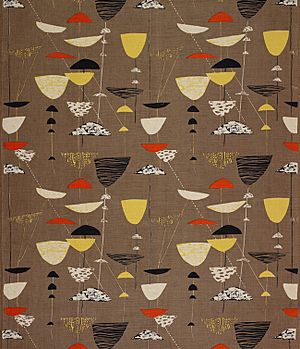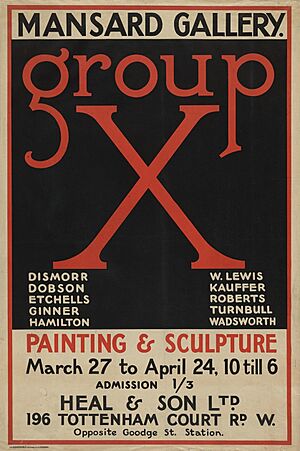Heal's facts for kids
 |
|
|
Formerly
|
Heal & Son |
|---|---|
| Subsidiary | |
| Industry | Retail |
| Founded | 1810 |
| Founders | John Harris Heal and son |
| Headquarters | London, England, UK |
|
Number of locations
|
7 |
|
Key people
|
Hamish Mansbridge (CEO) Sir Ambrose Heal Sir Terence Conran Colin Pilgrim |
| Products | Home furnishings |
| Revenue | £37 million (2022-23) |
| £800,000 (2022-23) | |
| Parent | Wittington Investments Limited |
Heal's is a famous British company that sells furniture and other items for the home. It has seven stores and is known for its modern and stylish designs. The business started way back in 1810 when John Harris Heal began making mattresses in London.
For over 200 years, Heal's has been a leader in design. A key figure was Sir Ambrose Heal, who brought the simple, handmade look of the Arts and Crafts movement to furniture that could be made by machines. This meant more people could afford well-designed items for their homes. Today, the company is still known for working with talented young designers.
Contents
The Story of Heal's
How It All Began
The first Heal's business was opened in 1810 by John Harris Heal. He started by preparing feathers for bed mattresses. In 1818, he moved the shop to Tottenham Court Road in London, where it still is today.
After John Harris Heal died in 1833, his wife Fanny ran the business. Later, their son, John Harris Heal Junior, took over. The company grew, adding a steam-powered machine to clean feathers and building a large new store in 1854. It was one of the biggest stores in London at the time. They were one of the first retailers to show furniture in room settings, an idea that almost all furniture stores use now.
A New Style of Furniture
In 1893, a very important person joined the company: Ambrose Heal Junior. He was the founder's great-grandson. Ambrose loved art and design. He wanted to create furniture that was simple, beautiful, and useful.
This was very different from the fancy, decorated furniture that was popular then. Some people at the company even called his simple designs "Prison furniture"! But Ambrose's ideas caught on. He used machines to make his Arts and Crafts style furniture, so it wasn't too expensive for ordinary families.
In 1913, Ambrose became the chairman of the company. He had a new store built with huge windows so people walking by could see the furniture inside. A special feature was a spiral staircase, which is still in the store today. At the top of the building, he opened an art gallery called the Mansard Gallery.
Modern Designs and Royal Recognition
Ambrose was always looking for new ideas. He was inspired by simple and clean designs from countries like Sweden and Finland. He also liked the bold shapes of the Art Deco style. In 1927, Heal's received a Royal Warrant from King George V, which is a special mark of recognition for companies that supply goods to the Royal Family.
During the 1930s, times were tough financially. Heal's created a line of more affordable furniture to help people still buy quality items. Ambrose's sons, Anthony and Christopher, also joined the business. They helped bring in even more modern ideas, including furniture made from steel tubes and bent wood.
The War and Post-War Years
During World War II, the Heal's factory stopped making as much furniture. Instead, workers made parachutes for the armed forces. This experience with fabrics led Heal's to start its own textile department after the war.
After the war, the British government had rules about what kind of furniture could be made. This was called Utility furniture, and it had to be simple and practical. Heal's made furniture following these rules.
When the rules were lifted in 1952, Heal's became a center for new and exciting designs. The company became famous for its colourful and modern fabrics, especially those by designer Lucienne Day. Her "Calyx" pattern from 1951 became a huge hit.
Changes and New Ownership
In the 1960s, Heal's was very successful. The main store was made bigger, and new stores were opened. The company continued to work with top designers to create unique furniture, toys, and textiles.
However, the 1970s were a difficult time for the business. By 1983, the Heal family decided to sell the company. It was bought by Terence Conran, the owner of the popular store Habitat. Conran was a big fan of Heal's and wanted to bring back its creative spirit. He updated the store and introduced new designs.
The company changed hands again in 1990 when a group of its managers bought it. They helped the business become profitable again and opened new stores.
In 2001, Heal's was bought by Wittington Investments, a company owned by the Weston family. Under the new owners, Heal's has continued to focus on great design. It launched the "Heal's Discovers" program to help new designers get their start. While some stores have closed, others have opened, and the company has adapted to changing times, including selling its products online.
The Mansard Gallery
The Mansard Gallery, located on the top floor of the Tottenham Court Road store, opened in 1917. Ambrose Heal wanted it to be a place to show off the work of talented artists.
It quickly became a very important art space in London. In 1919, it held the first exhibition in Britain of works by famous artists like Pablo Picasso and Henri Matisse. The gallery showed many different styles of modern art and was a meeting place for artists and writers.
The gallery closed in 1983 when the store was redeveloped. However, in 2022, a new Mansard Gallery opened on the first floor, bringing art back to the heart of Heal's.
The Story of the Heal's Cat
A fun story from Heal's history involves a bronze cat statue. The statue was made by a French sculptor and bought by Ambrose Heal in 1925. It sits at the top of the store's famous spiral staircase.
One day, a shop assistant named Dodie Smith—who later became famous for writing the book The Hundred and One Dalmatians—sold the cat to a customer. When Ambrose found out, he was very upset. He wrote to the customer to get the cat back! After that, a sign was placed next to the statue that said, "Heal's mascot. Not for sale." The cat is still there today.
 | Charles R. Drew |
 | Benjamin Banneker |
 | Jane C. Wright |
 | Roger Arliner Young |


